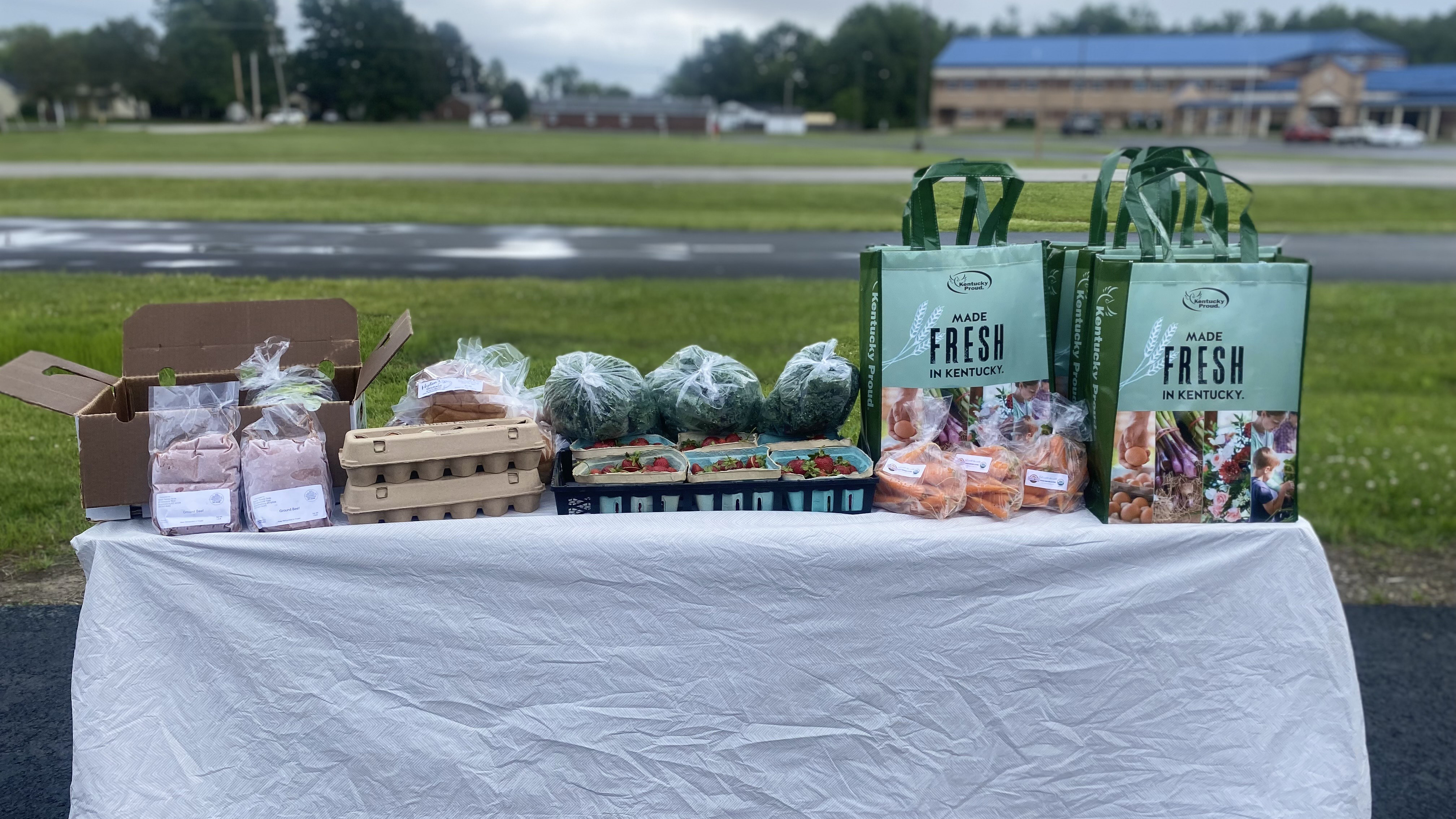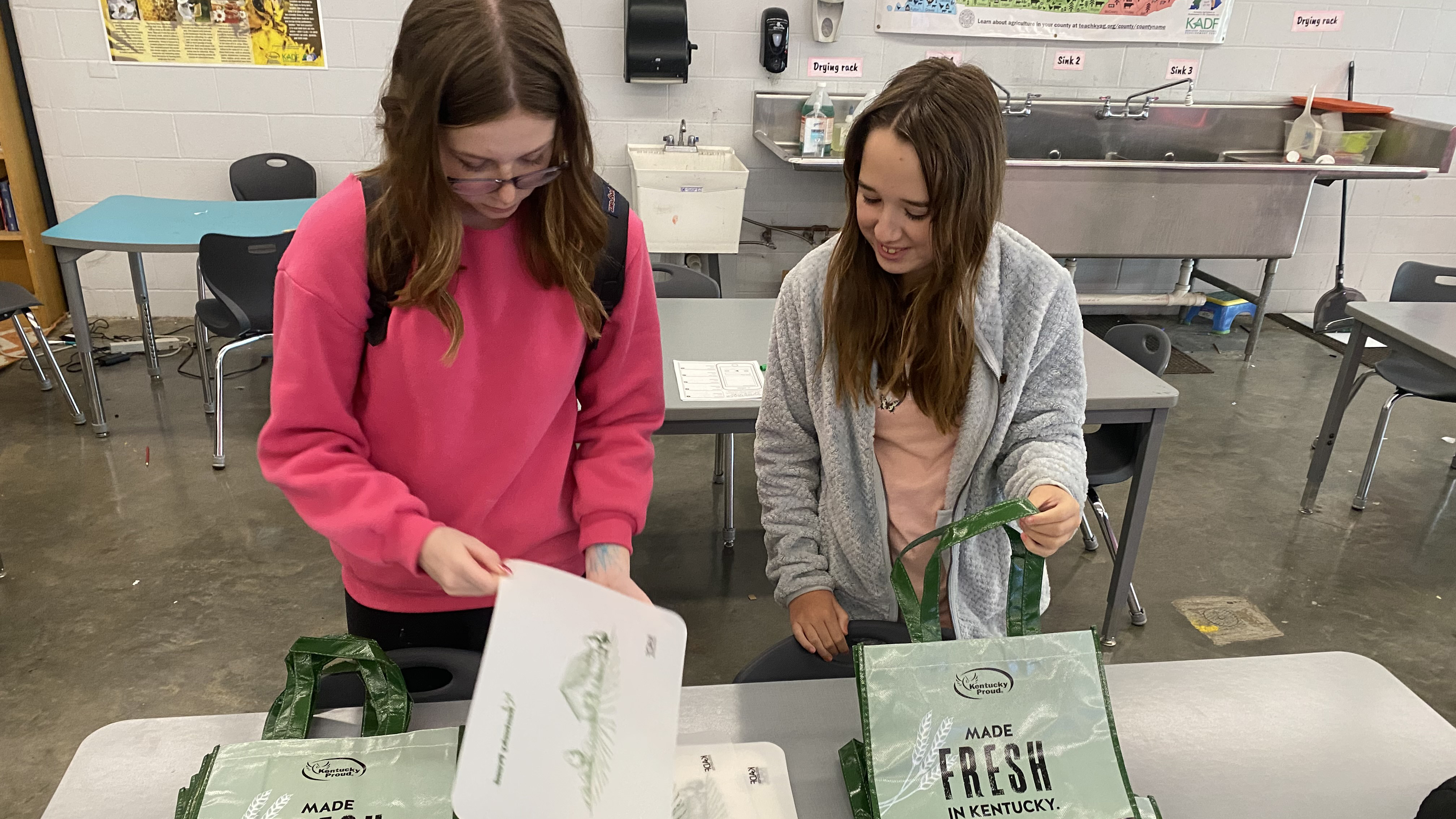UK faculty roll out Food, Farming and Community curriculum for Kentucky middle school students, 4-H youth
UK faculty roll out Food, Farming and Community curriculum for Kentucky middle school students, 4-H youth


A collaborative project between the University of Kentucky Martin-Gatton College of Agriculture, Food and Environment, Black Soil KY and Need More Acres Farm has resulted in an agriculture and food systems curriculum for young Kentuckians.
The Food, Farming & Community curriculum is an interactive, story-based learning tool that explores local food systems and agriculture career paths for Kentucky youth. Its goal is to encourage students to participate in agriculture and promote food literacy.
Nicole Breazeale, associate professor in the Department of Community and Leadership Development at Martin-Gatton CAFE, serves as the principal investigator for the project. Breazeale believes that the program will ignite youth’s passions related to the value of inclusive and sustainable local food systems.
“All youth deserve access to fresh, healthy, local food – and all youth deserve the opportunity to explore careers in growing and producing food,” Breazeale said. “I think this curriculum fills a gap and helps youth around the state get excited about an inclusive local food system, which is critical to the future of our state – our health, our economies, and our connection to each other.”
The curriculum centers around three videos showcasing stories of farmers and local food systems practitioners around the state, including teenagers involved in beekeeping, hydroponics and community supported agriculture.
Former UK football player and retired NFL player Avery Williamson, who grew up on a farm and is returning to agriculture, introduces the video series. Ashley Smith of Black Soil and Michelle Howell of Need More Acres serve as co-hosts.
"This project has been transformative for land-based storytelling in Kentucky. Our featured guests are at the top of their industry but are oftentimes overlooked and undersought,” Smith said. “The interviews weave together education, empowerment and innovation in reaching a critical audience to the future of agriculture—the youth!”
Ten interactive lessons have been developed around the video series, which culminate in a social action project.
Kimberly Haire, a middle school agriculture educator in Bullitt County, is one of seven agriculture educators who piloted this curriculum during the 2023-2024 school year. As someone in the midst of introducing more fresh foods into their diet and reducing their intake of processed foods, she knew her students could learn a lot in this space because she was learning alongside them.
“A lot of students and adults don’t know where their food comes from,” Haire said. “One of the things the curriculum did was break down global versus local foods, and I could see kids’ eyes opening. They were so engaged with the content because they know this affects them.”

For their social action project, Haire’s students worked to address the problem of food insecurity in their community. Since many low-income families lack access to fresh and healthy local produce and minimally processed food, they decided to make local food boxes. They purchased a wide variety of products from local farmers, including lettuce, strawberries, carrots, local tomato sauce and biscuit mix, local meat and other meal ingredients. They put those foods into boxes with recipe notes and cooking implements from UK Cooperative Extension and distributed them through their Family Resource Center.
“The most amazing part of the social action project was watching our community come together to support us,” Haire said. “Need More Acres Farm, Kentucky Farm Bureau and our local extension office are just a few of the groups that donated to help my students. It showed them this project is much bigger than just the classroom.”
Jocelyn Kemp is a 4-H agent in Hardin County. Unlike in the traditional agriculture classroom, 4-H agents have less time with youth during in-school programming due to class times and limited classroom visits. Because of this, 4-H agents went through and chose which curriculum lessons would be most valuable to 4-Hers.
“What makes 4-H unique is that while it’s statewide, it’s also individualized to your community,” Kemp said. “Our needs in Hardin County are going to look different from needs in other counties.”
Kemp was invited into a local middle school to teach a handful of lessons over a few months. Although it was not an agriculture class, the students were interested in food and excited to learn about it.
With the interactive, hands-on lessons and relatable content, Kemp noted how well the students retained the information from one month to the next. This encouraged her to bring in different food samples, teaching lessons about how those foods are made and how many places our food travels before it’s on our plates.
“The first food lesson was called ‘the path of popcorn,’” Kemp said. “I helped them track the popcorn all the way from when it’s corn in the field to in their hands. It helped them understand, ‘this is convenient for me to go and buy this, but what’s the process behind it?’ and I could see their wheels turning.”
Kemp said introducing her students to the people – farmers, distributors, drivers, packagers and more – behind just one snack that they eat helped them understand the importance of each step taken between farm and table.
“It doesn’t matter where you grow up or how you grow up. If you’re passionate about agriculture, there are unlimited possibilities for how you can act on this knowledge,” Kemp said.
Michelle Howell of Need More Acres Farm agrees with Kemp’s sentiments.
“I was raised by a single mom with limited access to fresh foods. Surprisingly, I was placed in an introductory agriculture class when I was in eighth grade and became fascinated by the power available to humans when they are actively engaged in the food system,” Howell said. “My biggest hope is that we are inspiring students to consider farming as their future career.”
Stacy Vincent, director of undergraduate studies for Agriculture Education (AgEd) at Martin-Gatton CAFE, worked with Breazeale to bring this program to life.
“For students to take ownership in a curriculum so that they are motivated to take social action to help their community is the highest level of curriculum engagement and impact,” Vincent said. “To know that agriculture has an influence in their social action is the icing on the cake.”
To learn more about the Food, Farming and Community curriculum, visit https://cld.ca.uky.edu/food-farming-and-community.
This material is based upon work that is supported by the National Institute of Food and Agriculture, U.S. Department of Agriculture, under award number 2020-38640-31521 through the Southern Sustainable Agriculture Research and Education program under subaward number 00002624. USDA is an equal-opportunity employer and service provider. Any opinions, findings, conclusions, or recommendations expressed in this publication are those of the author(s) and do not necessarily reflect the view of the U.S. Department of Agriculture.
###
The Martin-Gatton College of Agriculture, Food and Environment is an Equal Opportunity Organization with respect to education and employment and authorization to provide research, education information and other services only to individuals and institutions that function without regard to economic or social status and will not discriminate on the basis of race, color, ethnic origin, national origin, creed, religion, political belief, sex, sexual orientation, gender identity, gender expression, pregnancy, marital status, genetic information, age, veteran status, physical or mental disability or reprisal or retaliation for prior civil rights activity.
4 H Youth Community & Leadership Development Extension


